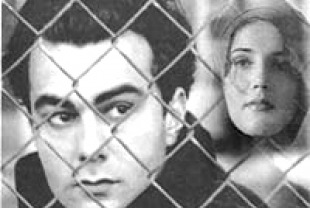This drama opens in Afghanistan in 1979 when Haris, a young boy, is ordered by his loving father (Naghi Mohammad Sanie) to flee the house when their village is attacked by the Russians. Years later in pre-9/11 Manhattan, this young man (Baktash Zaher-Khadem), who has become a painter and a sculptor, can still hear the machine gun fire that killed his parents. Haris has visions of his father's spirit, who shows up here and there as a guardian angel. One day he meets Sonny, a gregarious Afghan who owns a hot dog stand. This hospitable Muslim invites Haris for dinner and is surprised that he is not married and has no contact with the Afghan community in New York. Sonny introduces his daughter and his son, who is a rapper.
Laila (Mariam Weiss) is a fashion designer whose independence troubles her conservative Afghan parents. Her father (Yunis Azizi), a taxi driver, has arranged a marriage for her to her distant cousin (Abdullah Jewayni), a socially awkward tough guy; he tries to woo her by telling her he'd give her the nickname of a type of fighter plane. When she asks him what he is, he responds, "I am a satellite, watching everything."
Laila's younger brother Farhad (Omar Arzo) is also on her back, pressuring her to follow family orders. Her younger sister Zohra (Samira Cameron) yearns to be back in Afghanistan. Her obsession with the past frightens Laila. When Haris meets Laila, he is attracted to her beauty and even more delighted when he learns that she is Afghan. Although there are some obstacles that each must overcome, they seem destined for each other.
Jawed Wassel, the writer and director of FireDancer was murdered by a business associate in New York City in October, 2001, but the film was finished by associate director Vida Zaher-Khadem. It was released in Afghanistan and screened at the Ghazi Stadium, site of many Taliban punishments. The drama then became Afghanistan's first-ever entry to the Academy Awards for Best Foreign Language Film. It vividly conveys the challenges that Haris and Laila face as members of the large Afghan refugee community as they struggle to define themselves in the West. While they acknowledge the importance of their roots, some of them need to exercise their wings.
